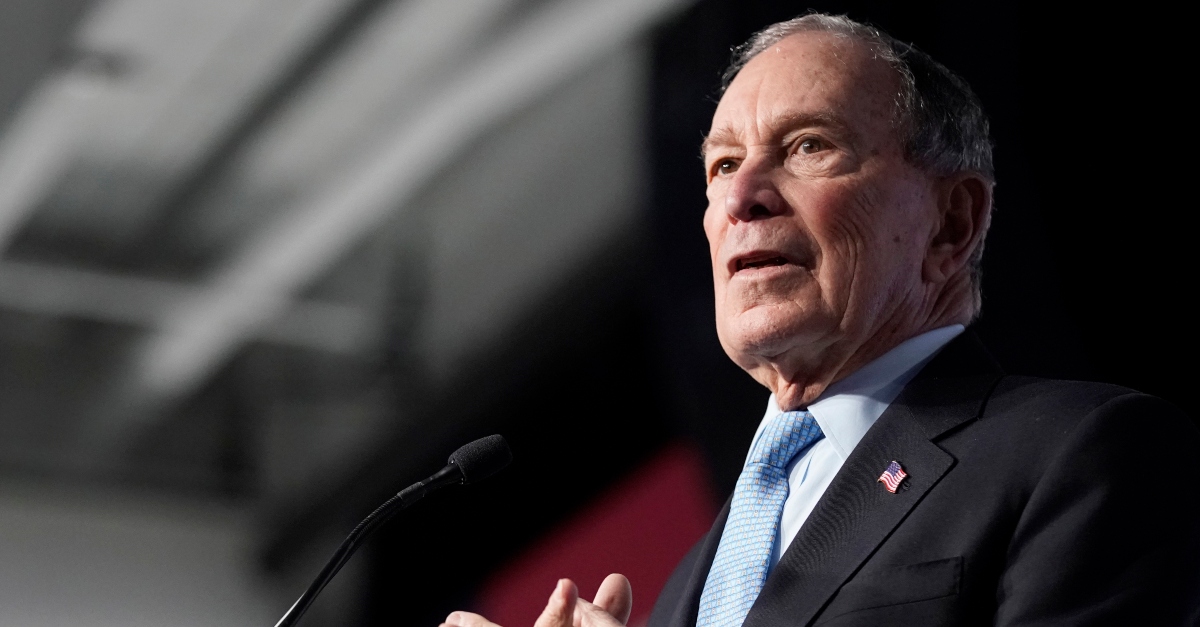
A federal judge in Manhattan ruled on Thursday that a group of former Mike Bloomberg’s 2020 presidential campaign staffers can go forward with a class action lawsuit. The suit alleges the staffers were promised employment and an income until November’s general election.
U.S. Magistrate Judge Gabriel Gorenstein of the Southern District of New York (SDNY) reasoned that the potential plaintiffs met the “modest burden” of showing that they were “similarly situated,” meaning they all allege they were harmed by a common policy or plan.
The initial complaint in the case was filed in March by Donna Wood, a former Bloomberg field organizer, who alleged that she was fraudulently induced into accepting the job by then-candidate Bloomberg’s promise to employ his staffers through November regardless of whether or not he won the nomination. Wood also alleged that the campaign failed to pay her and other organizers for overtime worked. Since the filing, more than 100 former field organizers had signed paperwork to join the action against Bloomberg.
After a poor showing on Super Tuesday, however, Bloomberg dropped out of the presidential race. Soon thereafter, Bloomberg broke his promise of job security by terminating the vast majority of his campaign staffers.
Attorneys for the campaign argued that the lawsuit should be dismissed, citing to employee handbooks that specifically stated all employees of the campaign were employed on an “at will” basis and could be terminated at any time. Several of the field organizers conceded that they signed at-will contracts, but said they could demonstrate that the promise of longevity in the role was essential to inducing them to join the campaign.
Gorenstein explained that in approving the plaintiffs’ motion to pursue the matter as a collective action, he was not ruling on the merits of the complaint against the campaign, but simply whether the group of plaintiffs satisfy the legal requirements to pursue litigation as a single unit.
“In other words, a court considers whether the proposed collective and the plaintiff allege a similar violation of the law, not on whether the law has in fact been violated. This conclusion is supported by the ample case law holding that consideration ‘of the merits is absolutely inappropriate’ at the conditional approval stage,” the order stated.
Gorenstein reasoned that 23 declarations from field organizers in 15 different states—all of whom said they performed the same duties and were subject to the same overtime policy—were sufficient to evince the similarities in the plaintiffs’ positions.
“Each of these declarations states that the declarant’s main duties were voter outreach and volunteer recruitment, that all other FOs observed by the declarant performed these same duties, that the declarant was not paid overtime despite working over 40 hours per week, and that the declarant observed other FOs working over 40 hours per week without receiving overtime pay,” he wrote. “These affidavits identify a specific common policy: the Bloomberg campaign’s decision to consider FOs exempt from the FLSA overtime requirements. Where a number of employees are subject to the same classification, courts routinely find that the ‘similarly situated’ standard is met.”
Read the full order below:
Bloomberg Class Action by Law&Crime on Scribd
[image via George Frey/Getty Images]